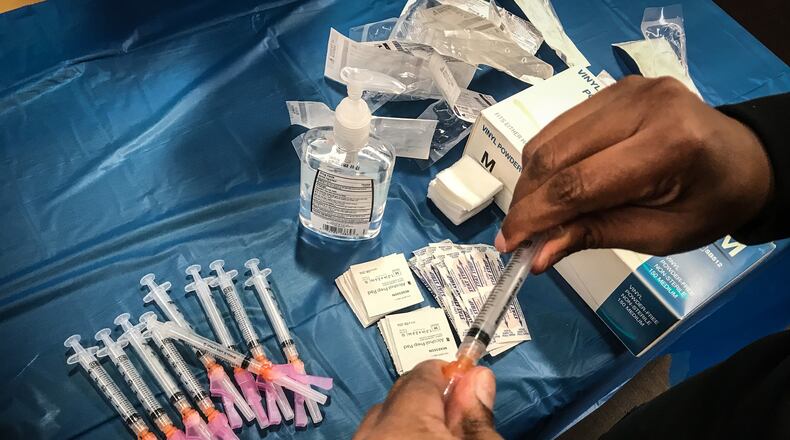Experts quoted in this article are:
- Dr. Roberto Colón, chief medical officer at Premier Health’s Miami Valley Hospital.
- Dr. Alonzo Patterson III, pediatrician with PriMed Physicians.
- Dr. Jeffrey Weinstein, patient safety officer at Kettering Health.
Q: I had some symptoms of illness (fever, fatigue, etc.) after receiving my second dose of the Pfizer vaccine. Should I be worried a third dose will make me feel even worse?
Weinstein: Experience and data so far show that side effects of a third dose or booster are similar to those that occur with the second dose. The most common side effects are fatigue, muscle aches and arm pain. Like with the first two doses, these side effects are short-lived and only last about 24 hours.
Patterson: Everybody can respond to vaccines differently but side effects after the third dose have not been shown to be more significant. Self reported side effects from over 12,000 people in the United States with immunocompromised conditions who recently had a third dose of the Pfizer or Moderna mRNA vaccine revealed that local reactions (itching, pain or redness) were similar to those who reported these side effects after the second dose. Symptoms such as fatigue, muscle aches or headaches, typically the next day, occurred in about 74% of those who responded to the survey compared to 76% after their second dose. New data released Sept. 30 revealed that among the 3.2 million people who received a third COVID vaccine in Israel, they reported mild local and even systemic side effects significantly less frequently than with previous vaccine doses and only 19 people reported more severe side effects that are still being investigated by medical experts.
Credit: Jordan Laird
Q: Can I take over-the-counter pain relievers such as Advil or Tylenol to manage any symptoms after getting the coronavirus vaccine? Or does that dampen the effectiveness of the vaccine?
Weinstein: It is fine to take Tylenol or a non-steroidal anti-inflammatory such as ibuprofen (Advil or Motrin) after receiving the vaccine. This should not affect the effectiveness of the shot. It is not recommended to take any of these medications before receiving the vaccine.
Patterson: Some studies, mostly done in children, have shown a slightly blunted immune response when children were pretreated with over the counter oral pain medications for routinely administered vaccines. Similar studies in animal models have shown the same thing. However, it was not felt that the blunted response was enough to keep the vaccination from being effective at providing good protection. In all of these studies medication was given prophylactically, before the vaccine was given. No studies have shown similar blunting of the immune response when medications are used to treat side effects after the vaccine. So the take away message is that it is OK to treat side effects with OTC acetaminophen, ibuprofen or naproxen and not worry that you are decreasing the effectiveness of vaccination.
Q: I have heard that there is a chance that the coronavirus vaccine could cause fertility issues. Is this true?
Weinstein: To date there is no evidence that COVID-19 vaccines have a detrimental effect on either female or male fertility. Some myths have been circulating around this issue, but they are not true.
Colón: This is an absolute myth that has been disproven. There is no demonstrated impact on a man or woman’s ability to have children from the COVID-19 vaccine. However, COVID-19 infection can and does increase the risk of pregnancy complications, including miscarriage and preeclampsia. Being vaccinated against this virus can in fact help reduce the risk of pregnancy complications from COVID-19.
Q: If people are still dying of COVID-19 after getting vaccinated, why should I get the shot?
Weinstein: While there are a small number of deaths among those who are vaccinated (mostly in the elderly), the large majority of deaths are occurring among people who are not vaccinated. This includes young people and pregnant women. Obesity seems to be a major risk factor for death in those younger than 60 years of age. Another reason to be vaccinated is the fact that a large percentage of people who get COVID-19 develop long haul symptoms that can affect them for many months.
Colón: Yes, if you have not received the vaccine, you should absolutely receive it! While it is true that some vaccinated individuals have still become infected with COVID-19 and not survived, this is extremely rare. The vaccine significantly reduces the chances that someone will die from COVID. In Ohio, more than nine out of 10 people who have died from COVID-19 were unvaccinated. These vaccines lower the risk of hospitalization and death — very similar to the flu vaccine.
Patterson: The simple fact is that vaccination makes hospitalization and death from COVID-19 far, far, far less likely and breakthrough infections are uncommon. A study in Texas found that only 6.5% of the infections occurring now are in people who are fully vaccinated. Of the 27,701 COVID-19 hospitalizations that have occurred in Ohio since Jan. 1, 2021, as of Sept. 29, only 1,014 have occurred in fully vaccinated individuals. Of the 8,178 COVID-19 deaths in Ohio during the same time period, 8,032 of those who died were not vaccinated.
Another consideration is that if you are vaccinated and are one of the few to have a breakthrough infection, you are not contagious nearly as long. A vaccinated person only has high levels of virus for three-four, compared to an unvaccinated person who has levels high enough to infect others for up to 10 days, making a vaccinated person less likely to share the infection with people around them. If you are vaccinated and have a breakthrough infection, you will be a risk to fewer co-workers, family members and those you love.
Have questions about COVID-19, face masks, vaccines, testing, quarantining or anything else pandemic-related? Send them to jordan.laird@coxinc.com. Answers will be published regularly in print and online.
About the Author

